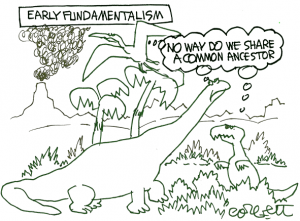Akim - Google Blog Search |
| Recent Posts - The Public Professor Posted: 06 Nov 2013 08:58 AM PST  For many non-believers such as myself, and even for some believers, there is a tendency to view religion, or at least extremist versions of it, as the primary danger to modern democracy and freedom. For many non-believers such as myself, and even for some believers, there is a tendency to view religion, or at least extremist versions of it, as the primary danger to modern democracy and freedom. Many people conflate religion with dogma, thinking they are one and the same, and that religion more than anything else is what threatens humanity's march towards representative government, scientific progress, and individual freedom. This line of thinking is only encouraged by headlines about fundamentalist Muslims in a number of countries literally fighting to assert a theocratic vision over hundreds of millions of people. Likewise, India and Israel are home to fundamentalist Hindus and Jews respectively who want to implement a theocratic vision of their nations. Many Westerners instinctively blame religion itself as the reason for fundamentalist Muslims, Hindus, and Jews attacking republican institutions and pushing for a more theocratic form of life. However, I believe that isolating religion as the cause for surging in anti-democratic extremism is mistaken. Not only is it simplistic to label religion as the root cause for such totalitarian movements, but by ignoring the larger factors is potentially dangerous, as it draws our attention away from other important explanations. When contrasting the West to places mired in such struggle, it becomes oh, so easy for those of us in the United States, Europe, and other parts of what was once known as the Christian world to smugly assert that we moved beyond such theocratic perils some time ago, and that we simply shan't be returning. It is tempting for some to see history as a fairly steady, linear advancement. Casting history as a march of progress allows people to frame the secular West as winning some kind of race, and as superior to, say, the Middle East, which many suppose is "still" struggling to achieve secularism. But that interpretation is dangerous on at least two counts. First, the West did not permanently move past the dogmatic totalitarianism after European theocracy went into decline. Other forms of dogma have and do plague Western society, threatening the secular, republican vision that secures civil liberties. Furthermore, some of the societies around the world that are now struggling to avoid the imposition of a theocracy, have in fact been very secular in the recent past. History is not a race that moves ever forward. There are no guarantees about history except that it is dynamic; things always change. And change does not occur in some neat, linear pattern. Societies often retrace their steps in one way or another, and totalitarianism of various shades can come and go. To illustrate this, we can look at dogmatic impulses that have continued to dog the West long after the collapse of Europe's medieval theocratic order. For starters, it is quite clear that real theocratic impulses are actually still alive and well in some places across the West, and particularly here in the United States, where religion routinely trumps science in the minds of many people. For example, polling data has consistently shown that a majority of Americans are either ambivalent about Evolution or deny it outright. When attempting to explain how a majority of the population in a modern Western nation is willing to deny a firmly established scientific tenet, many are quick to blame religion; that religion itself, particularly Christian fundamentalism, is responsible for such anti-scientific attitudes. As if there were some inherent rivalry between science and religion, particularly evangelical Protestantism. After all, the Americans most likely to reject Evolution are Jehova's Witnesses, Mormons, and various Evangelical Christians, in that order: groups that the popular culture associates with religious fundamentalism. However, it's actually more complicated than simply blaming a particular religion or set of religions for a dogmatic impulse. First, all religions are dogmatic by definition. They all have faith-based doctrines that will brook no challenge. Second, all religions have immensely broad theologies that are open to interpretation, and various interpretations typically reflect people's experiences in a particular historical moment. So we should think long and hard before labeling any particular religion or denomination as being more dogmatic than others. And when we do, we should carefully identify the historical factors driving this development, and appreciate that it is born of a particular moment that will not last forever. That's because, generally speaking, theological details do not drive people's actions and beliefs. Rather, larger historical forces drive people; theological details merely frame their actions and beliefs. If you need further proof, then just ask yourself how we are to explain American Catholics? Nearly half of American Catholics also reject Evolution. This is quite peculiar considering the Catholic Church is arguably the world's most hierarchical religious structure, and boasts a vast, detailed and (as far as it's concerned) infallible and indisputable set of theological dogma. And official Catholic theology accepts human evolution. Which helps explain why the vast majority of people in predominantly Catholic nations like Italy, Ireland, and Spain readily accept Evolutionary theory. So when seeking to explain why so many American Catholics are hostile towards Evolution, we must conclude that the reasons extend beyond just religion itself. Catholicism is not why many American Catholics reject Evolution. It's because of broader historical and cultural forces in turn of the 21st century America. This realization should make us rethink the idea that theocratic movements elsewhere in the world exist simply because of religion. As counter-intuitive as it m The larger causes of totalitarianism are various political, economic, social, and cultural instabilities. Such instabilities can lead people to seek dogmatic interpretations of the world, and to embrace totalitarian movements as expressions of those dogmas. And all dogmas, not just religions, display rapacious qualities. Expansive dogma is the disease, a quest for absolutism is the symptom, and the emergence of a totalitarian age, in which all other forms of knowledge must bow down, is the terminal condition. There are actually many brands of dogma that, during unstable times, can gain supremacy and become the vehicle for totalitarianism. Using religion to create a theocracy is just one example. Indeed, during the 19th century, much of the West traded religious theocracy for a different form of dogmatic totalitarianism, one based on race and ethnocentrism. And as religion can find totalitarian expression through theocracy, racism and ethnocentrism have at times found totalitarian expression through ethnic nationalism. Europe's move away from the religious domination of the medieval era was a centuries long process. And one of the results of waning church power was the rise of the nation-state. But the decline of church power in the face of more secular state institutions did not mean that fundamentalism disappeared with it. Quite to the contrary, nation states have spawned a variety of new fundamentalisms over the last two centuries. The most obvious of these, and probably the most damning, has been ethnic nationalism. In many respects, religious extremism yielded to racial and ethnic extremism during the 19th and 20th centuries. To some degree, the old dogma religious absolutism was replaced by a newer dogma of ethnic and racial absolutism. The most reprehensible results of that impulse can be seen in everything from racial apartheids in the United States and South Africa to Nazi exterminations of Gypsies and Jews. Today, religion remains in the West, but its influence is greatly diminished. Likewise, ethnic nationalism remains in the West, but its influence is also greatly diminished; World War II was the vital and bloody crucible that commenced its retreat. In a broad sense, Nazi atrocities greatly discredited racial theories, or at the very least opened them to serious question. Even then, however, tearing down ethnic nationalist totalitarianism has not occurred overnight or without mighty struggle. Various civil rights movements around the world have spent decades challenging ethnic, racial, patriarchal, and heteronormative hegemonies. We should be so lucky as to believe that ethnic nationalism is on a permanent decline. Maybe. Hopefully. Probably not. Furthermore, given religion's profound influence on humanity, I think it's näive to believe that the West has seen the last of theocratic movements. Even as Islamic, Jewish, and Hindu extremists struggle to assert theocracy elsewhere, Westerners should not assume the threat of Christian theocracy is behind them forever. It could pop up again, with current brands of Christian extremism in the United States serving as a testament to that ongoing threat. While extremist versions of both religion and ethnic nationalism have been substantially beaten back, we must k A longer version of this piece originally appeared as a two-part article at 3 Qiarks Daily. Filed under: Current Events |
| You are subscribed to email updates from Akim - Google Blog Search To stop receiving these emails, you may unsubscribe now. | Email delivery powered by Google |
| Google Inc., 20 West Kinzie, Chicago IL USA 60610 | |



Tiada ulasan:
Catat Ulasan